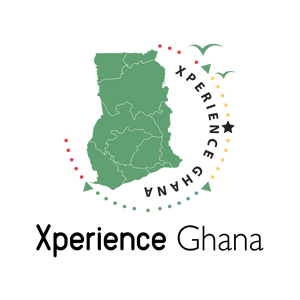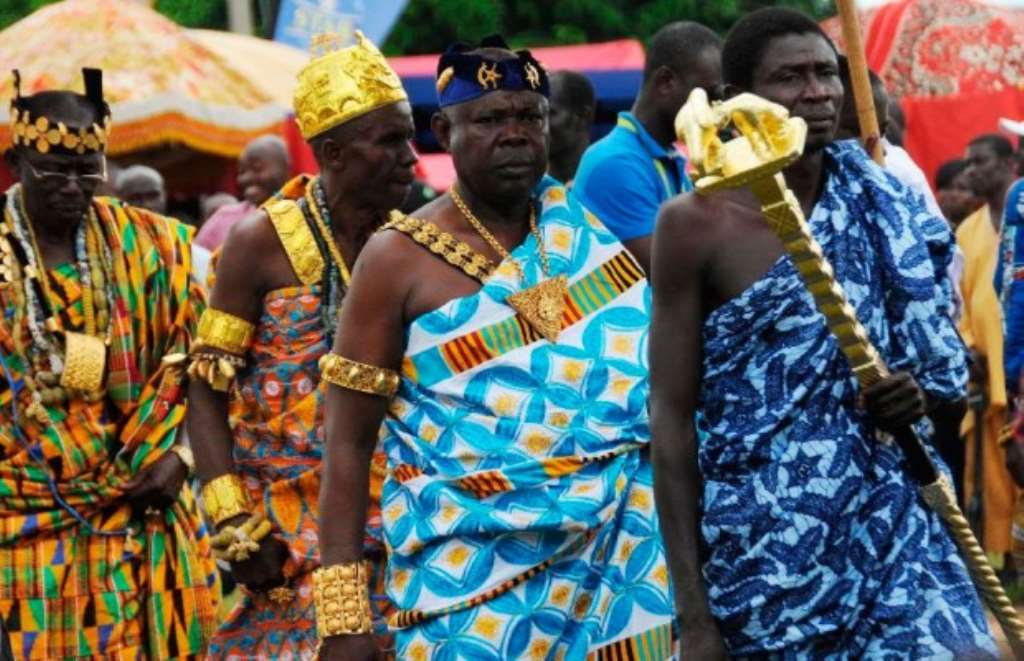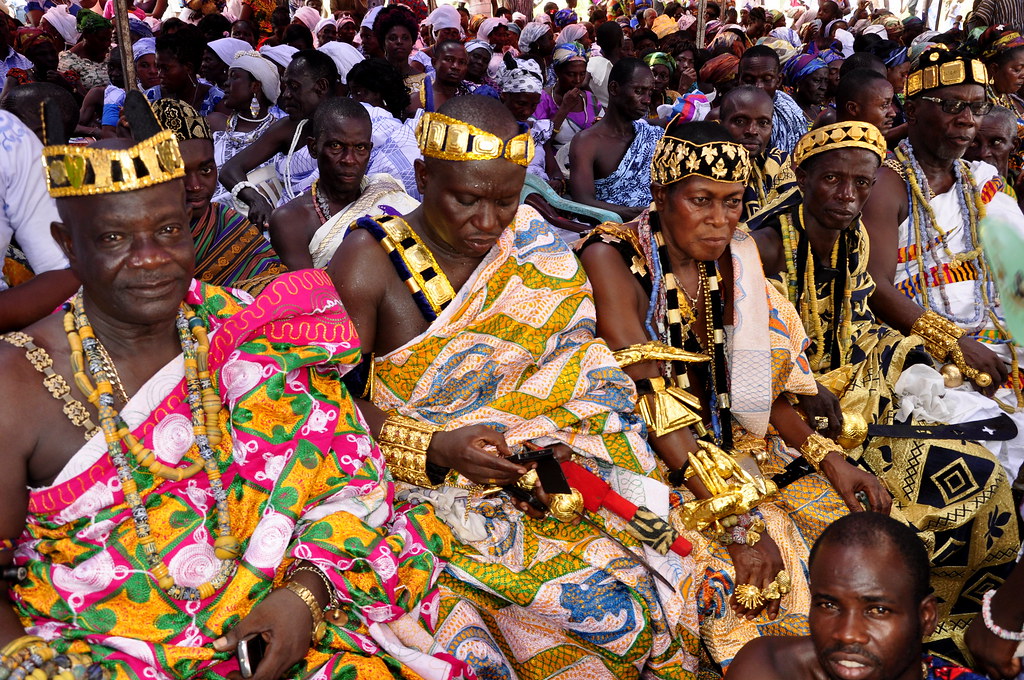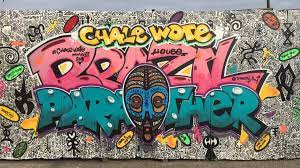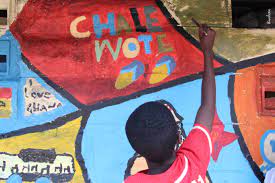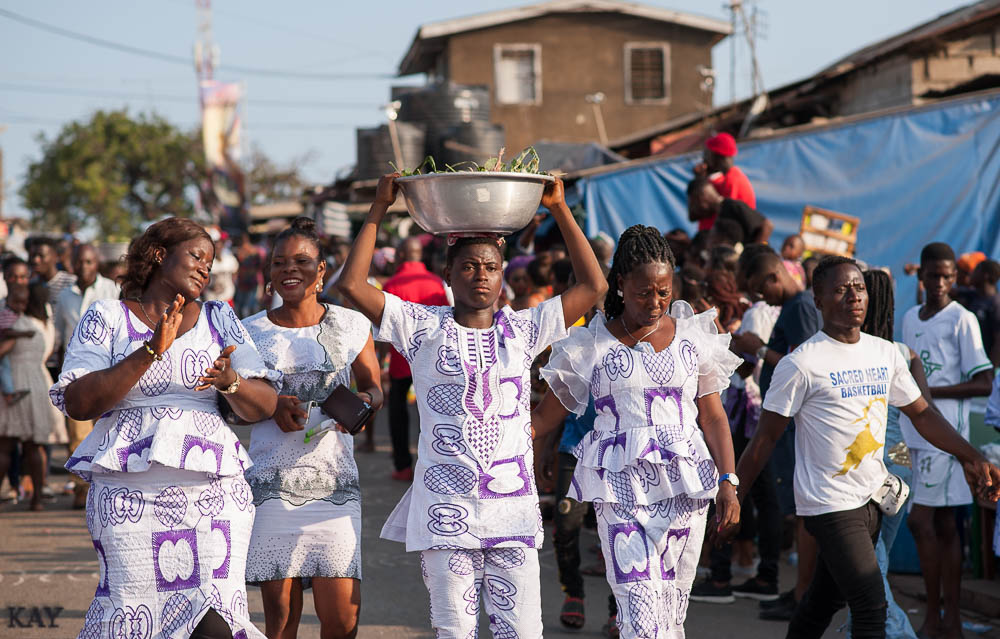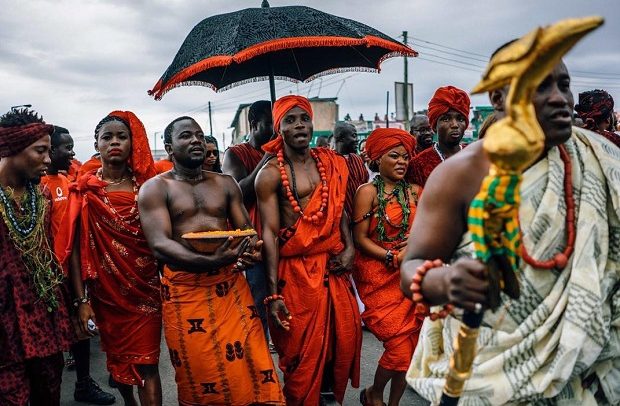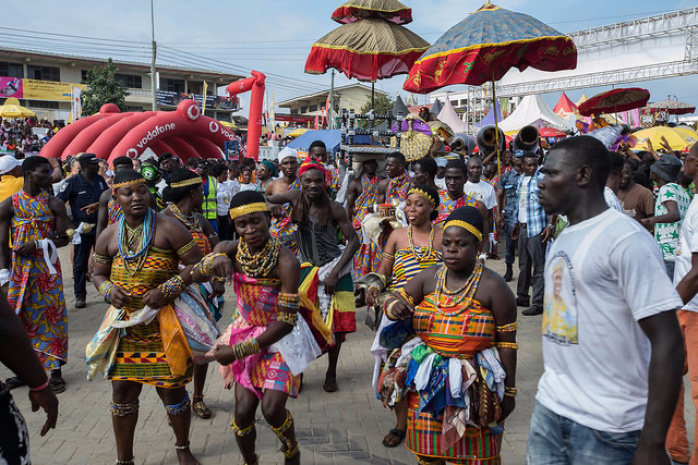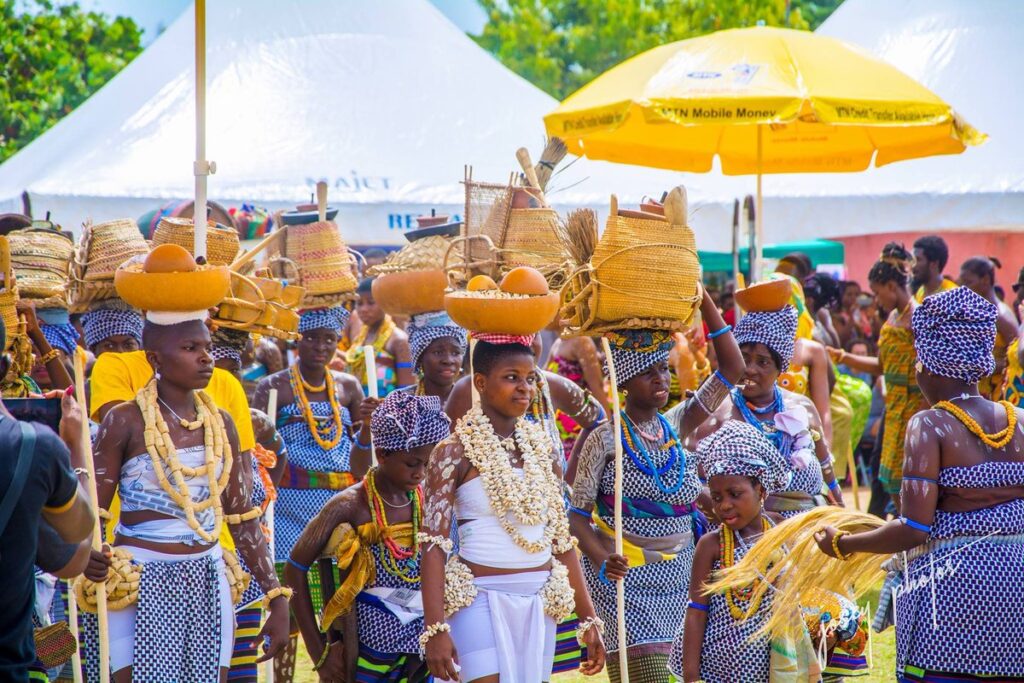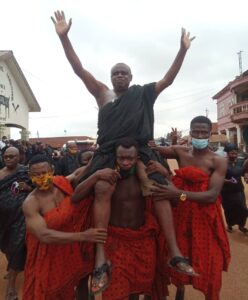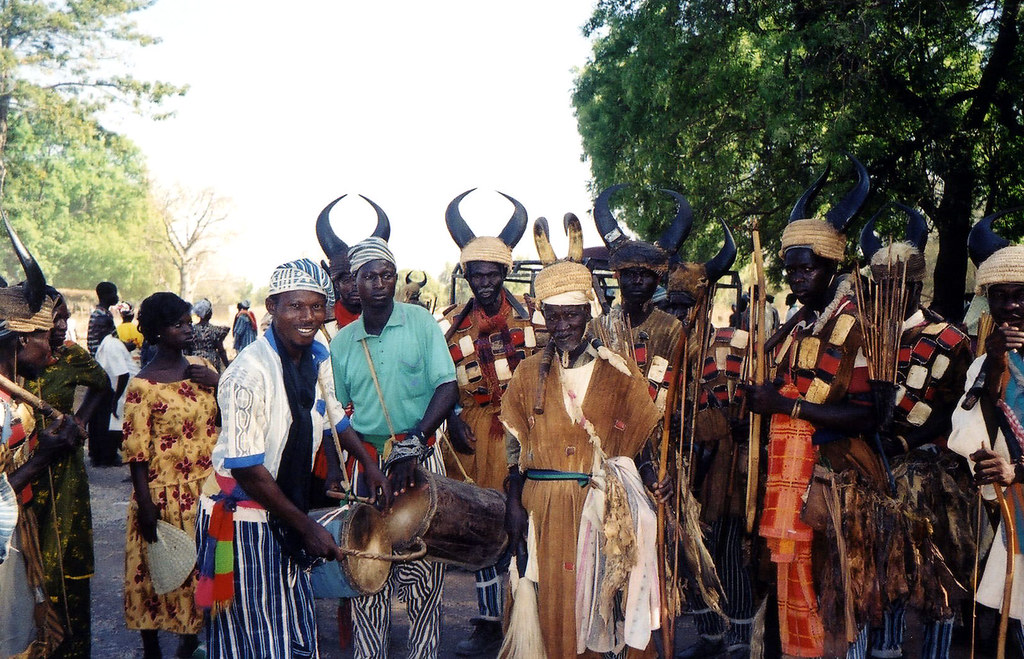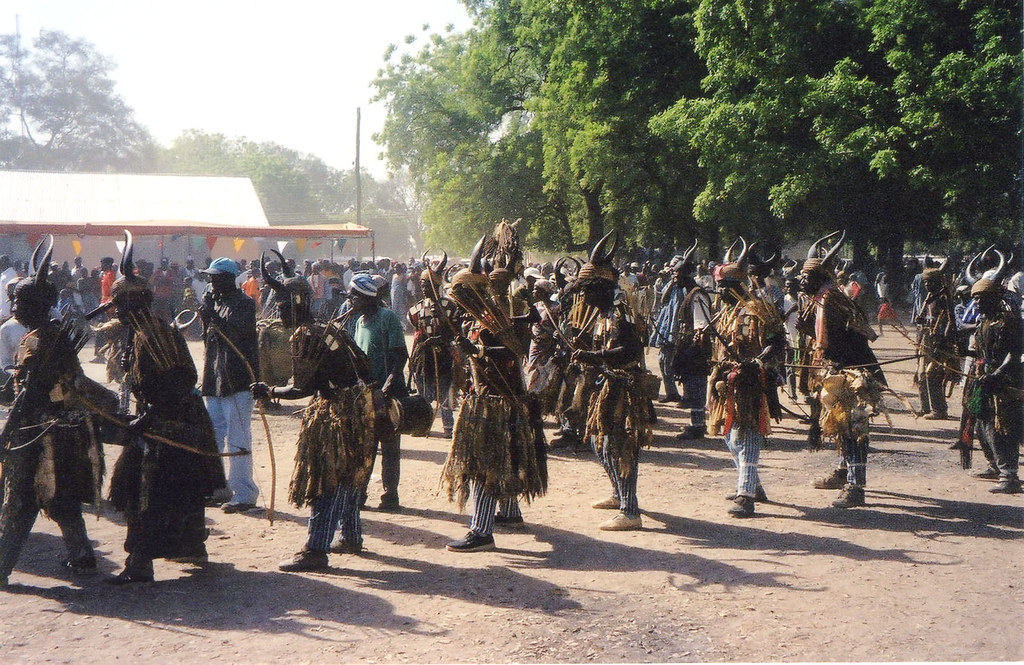Festivals are colorful days of celebration in Ghana, cultural festivals are a vibrant part of life and heritage of hearty Ghanaians. All year long, festivals and durbars are held in various parts of the country to celebrate the heritage of the people. These festivals and durbars are held in various parts of the country to mark cultural new years, celebrate reunion of families and friends, development purposes and also strengthen the tenets of society.

Most people believe that festivals help them forge close bonds with their ancestors and to seek protection, favor and success. Festivals are also held in order to purify the community so that people can enter the New Year with confidence and hope.
Festivals Celebrated in the Month of January
- Bugum Festival: Although the Bugum Festival was also linked with Islam, it has become a key event on the traditional calendar too. It commemorates the flight of Naiyul-Lah Mohammed from Mecca into exile in Medina in AD658. The festival is celebrated in Dagbon, Gonja, Mamprusi and Nanumba. The events begin with parades from neighboring villages. By nightfall, all the villagers congregate at the Chief’s palace with lighted torches. Succeeding special invocations by the Chief, the ceremony illuminates the streets. Festive drumming and dancing continue until the early hours of the morning.
2. Edina Bronya Festival: This is the native version of Christmas which is solely celebrated by the people of Elmina (Edina) on the first Thursday of the New Year. The festival was influenced by the Portuguese settlers who celebrated a similar event every January. For the people of Edina, it is a period of purification, sacrifices to the gods, remembrance of the dead, and the welcoming of a new year. Families pour libations and invite friends to participate in dining, and merry-making, throughout the town.
Festivals Celebrated in the Month of February
- Dzawuwu Festival: It is an annual traditional and thanksgiving festival celebrated by the chiefs and people of Agave Traditional Area in Dabala in the Volta Region of Ghana. It is usually celebrated in the month of February to commemorate and celebrated the bravery of the Agaves in the past, who fought and won several wars and also pay homage to those who have departed.
Festivals Celebrated in the Month of March
- Damba Festival: Damba is celebrated to mark the birth and naming of the Holy prophet, Muhammad, but the main purpose of the celebration is a glorification of the chieftaincy, not specific Islamic motifs. The festival is categorized into three sessions; the Somo Damba, the Naa Damba and the Belkulsi. The Damba festival is celebrated by the chiefs and people of the Northern, Savanna, North East and Upper West Regions of Ghana. This festival is celebrated in the Dagomba lunar month of Damba, corresponding to the third month of the Islamic calendar, Rabia al-Awwal.
2. Papa Nantwi festival: The Papa Nantwi festival is an annual festival celebrated by the people of Kumawu in the Sekyere East district in the Ashanti Region of Ghana, in the month of March every year. It is a cultural festival commemorated by all Ashantis though the cultural events took place at Kumawu. The festival is held to commemorate the bravery and self-sacrificial spirit of their great ancestor, Nana Tweneboa Kodua (I) who is purported to have offered his life to be sacrificed to assist the Ashantis in defeating the Gyamans who were their criminal overloads.
3. Ngmayem Festival: This is the annual traditional harvest and thanksgiving festival of the Krobo people. It is celebrated in March-April by the people of Manya and Yilo Krobo in the towns of Krobo Odumase and Somanya, in the Eastern Region.
4. Volo Festival: Is celebrated by the people of Akuse, In the Volta Region to commemorate the end of the exodus of the Volo people from Togo, forced to flee the tyranny of an impious ruler. this is an annual festival celebrated by the chiefs and people of Akuse in the Volta Region of Ghana.

Festivals Celebrated in the Month of May
- Aboakyir (Deer Hunt) Festival: “Aboakyir” literally, means “game hunting”. This popular festival is celebrated on the first Saturday of May by the chiefs and people of Winneba. The festival begins with a competitive hunt between 2 traditional warrior groups in a nearby game reserve, where each try to catch an antelope live. It is an adventurous event to test the strength, bravery, determination and intuition of the 2 rival groups. The winner presents the catch to the Paramount Chief who sits in state with the sub-chiefs and subjects.
The antelope is sacrificed as an invocation for good harvest and a bountiful fishing season. A durbar and procession of the chiefs and warrior groups in their colouful regalia is the highlight of the celebration. Brass bands, dancing, performances of folklore and parties make this an unforgettable event. Formerly, it involved capturing a leopard barehanded, the toll on human life eventually became so prohibitive that the divinity to whom the leopard was sacrificed was beseeched to accept a less dangerous substitute, and the leopard was replaced by an antelope.
Festivals Celebrated in the Month of June
- Nkyidwo (Monday Night): A very important festival celebrated annually by the people of Essumeja, in the Ashanti Region to commemorate their birth or how their ancestors emerged one Monday night from a hole in the ground followed by a dog and lion amid drumming, dancing and other activities. The gods are invoked for blessing, protection and prosperity of the people.
Festivals Celebrated in the Month of July
- Bakatue Festival: Literally translated to mean “opening up of the Benya Lagoon into the sea”, Bakatue symbolizes the beginning of a fishing season, which is the main livelihood of the people of Elmina. It is celebrated annually in Elmina on the first Tuesday in July and originated centuries ago, long before the arrival of the Europeans. The splendid ceremonies include a durbar of chiefs, a colouful regatta of canoes on the Benya Lagoon and processions. A solemn “net casting” ceremony symbolizes the beginning of a new fishing season, and the catch is offered to the deities of the traditional area. You are invited to take part in the regatta and merry-making.
Festivals Celebrated in the Month of August
- Asafotu-Fiam Festival: “Asafotufiam” is an annual warrior’s festival celebrated by the people of Ada, in the Greater Accra Region from the last Thursday of July to the first weekend of August. It commemorates the victories of the warriors in battle and those who fell on the battlefield. To re-enact these historic events, the “warrior” dresses in traditional battle dress and stage a mock battle. This is also a time when the young men are introduced to warfare. The festival also ushers in the harvest cycle, for this special customs and ceremonies are performed.
These include purification ceremonies. The celebration reaches its climax in a durbar of chiefs, a colorful procession of the Chiefs in palanquins with their retinue. They are accompanied by traditional military groups called “Asafo Companies” amidst drumming, singing and dancing through the streets and on to the durbar grounds. At the durbar, greetings are exchanged between the chiefs, libations are poured and declarations of allegiance made.
Chale Wote festival: The Chale Wote Street Art Festival also known as Chale Wote is an alternative platform that brings art, music, dance and performance out into the streets. The festival targets exchange between scores of local and international artists and patrons by creating and appreciating art together. As this event is known as climax for the summer season in Ghana, thus attracts thousands of people from all parts of the country as well as worldwide regions. This year’s event has been slated for the 20th – 22nd of August, 2021 on the Prof. Atta Mills High Street in James Town-Accra.
2. Odambea Festival: “Odambea” is celebrated on the last Saturday of August by the “Nkusukum” chiefs and people of the Saltpond Traditional Area. This event commemorates the migration of the “Nkusukum” people centuries ago from Techiman (500km away) to their present settlement. “Odambea” means “fortified link”, a name resulting from the role played by the “Nkusukum” people in keeping the migrant groups in touch with each other following their exodus from Techiman. A special feature of the festival is the re-enactment of the ancient life styles of the people, which will provide you with a unique opportunity to learn more about how they migrated.
3. Homowo Festival: This is a harvest festival celebrated by the people of the Ga Traditional Area, in the Greater Accra Region. It originated from a period of great famine which was eventually followed by a bumper harvest in grain and fish. Thus, the word “Homowo”, literally means “hooting at hunger”. The main highlight of this month-long festival is the special dish prepared from ground corn, steamed and mixed with palm oil and eaten with palmnut soup.
Prayers for a peaceful and prosperous year are offered. Each Ga chief is followed by a retinue with drumming, dancing and singing through his area where he sprinkles some of the special dish called “kpokpoi” and pours libation. It is merry-making for Gas, and visitors in particular are invited home to join in the feasting.
4. Kundum Festival: Kundum is celebrated from August to November by the Western Region’s coastal tribes, the Ahantas and Nzemas. Beginning in August, the festival moves west from Takoradi to town after town at weekly intervals. Rituals include purification of the stools and prayers to the ancestors for a good harvest. Traditional drumming and dancing feature prominently.
5. Afenorto (Staying at Home) Festival: This festival is celebrated annually by the people of Mepe, in the Volta Region to take stock of their lives, strengthen family and friendship bonds and pay homage to their ancestors through pouring of libation and funeral obsequies. It is also the period during which the people take stock of their lives and plan for the future; when young men meet their future spouses and pay homage to their ancestors through libations and undertake development projects.
Festivals Celebrated in the Month of September
- Fetu Afahye Festival: It is celebrated annually on the first Saturday of September by communities in the Cape Coast Traditional Area (Fetu). It is characterized by a durbar of chiefs and processions of “Asafo Companies” (traditional warrior groups) and numerous social organisations. Every member of the group is adorned in rich and colourful clothes, thus creating the grandeur of this festival which literally means “adorning of new clothes”. A procession of the “7 Asafo Companies” in their unique costumes depicts a fusion of the “Fante” and European cultures, (typically, Portuguese, Dutch, Swedish and British), which have been sustained over many centuries. Customary rites include the slaughter of a cow to the 77 Deities in the area to obtain their blessings.
2. Nkronu Festival: Is celebrated by the people of Shama/Beposo, in the Western Region. A very colourful festival and it involves purification of stools, prayer to ancestors for good harvest and long life.
3. Sometutuza Festival: Annual colourful festival of the “SOME” people of Agbozume, in the Eastern Region to commemorate the exodus from their original Home (Keta) and subsequent settlement at Agbozume. Activities of the festival include a display (exhibition) of different types of “Ewe Kente” cloth, traditional and woven textile.
4. Odwira Festival: This festival is celebrated in most Akwapim towns during the months of September and October, with the most colourful festivities taking place at Akropong, Amanokrom and Aburi, in the Eastern Region. During “Odwira”, the Chiefs sit in state and receive homage from the people. The ceremonies include purification of the stools and performance of traditional rites. Libations are poured to the gods for prosperity and the general well-being of the people during the ensuing year. Drumming and dancing accompany the celebration.
Festivals Celebrated in the Month of November
- Hogbetsotso Festival: The “Anlo Ewes”, an ethnic group on the eastern cost (Volta Region) of Ghana, are believed to have settled in Notsie in Togo when they first migrated from Southern Sudan. Legend has it that they escaped from the tyrannical ruler of Notsie, Ago-Koli, by walking backwards. In order to commemorate the exodus and the bravery of their traditional rulers who led them on the journey, the people created this annual “Festival of the Exodus”. There are many ceremonies associated with the festival, including a peace-making period where all outstanding problems are supposed to be resolved.
This is a purification ceremony of the traditional stool and a period of general cleaning when the villages are swept and rubbish burnt. This cleaning ceremony begins at the Volta Estuary and goes on for days until it finally reaches the Mono River in the Republic of Benin. An essential aspect of the festival is a durbar of chiefs and the people. Chiefs dress in very colouful regalia and sit in state to receive homage from their subjects. Dancing, singing and general merry-making go on throughout the festival. The main durbar always takes place on the first Saturday of November in Anloga, in the Volta Region.
2. Kwafie Festival: The people of Dormaa Ahenkro, Berekum and Nsuatre, in the Bono region celebrate the “Kwafie Festival” between November and December. This event is celebrated in remembrance of the ancestors and it is also meant as purification. Among the many activities, the most interesting is the burning of a large bonfire in the courtyard. The Dormaas are reputed to have brought fire to Ghana and this legend is symbolically remembered through this bonfire. A durbar is also held during which homage is paid to the Paramount Chief by his sub-chiefs and subjects.
It is a period when all descendants of the original Dormaas (who broke away from the Akwamus and migrated here) come home to a grand reunion. Like Apoo, this festival fosters a spirit of unity among the people. Highlights of the activities include a pageant of the royal courts with drumming, dancing and a display of the paraphernalia of the Chiefs.
3. Apoo Festival: “Apoo” is celebrated in Techiman and Wenchi, in the Brong Ahafo Region in November. It is a festival for the purification of the people to rid them of social evil. The festival lasts one week and includes a variety of recreational cultural activity. It ends on the sixth day with the “Apoo” procession, when insinuations are cast about the evil doings of some of the citizens. Even the Chief is not spared. This period is a time for family reunions and unity among the people. You are welcome to join the festivities.
4. Sasabobirim Festival: A week long annual festival of the people of Awuah Domase, in the Brong Ahafo Region. It is celebrated in remembrance of their brave chief who joined Yaa Asantewaa to fight the Europeans in the early part of the 20th century.
Festivals Celebrated in the Month of December
- Feok Festival: The annual “Feok Festival” is celebrated by the Builsas of Sandema people in December. This is a war festival which re-enacts the ancient heroic exploits of the Builsas. Amid drumming and dancing, the gods are invoked for protection and seek for a bountiful harvest, favor and prosperity.
2. Adae and Akwasidae Festivals: The pomp and pageantry of the Ashanti kingdom is most vividly brought to life during beautiful Adae festivals which are held at the palace once every 6 weeks. These are occasions when the King, riding in a palanquin and adorned with all his gold ornaments, comes out to receive the homage of his sub-chiefs and people. It is a spectacular sight to watch the colouful canopies and umbrellas, the skillful drummers, dancers, horn-blowers and praise-singers at these regular festivals, held in honour of their ancestral spirits.
Time your visit to coincide with an Akwasidae festival, (Sunday Adae). You can determine the Akwasidae date by counting 6 weeks down the calendar from one Adae. In the Ghanaian society, celebrating a festival helps to educate the upcoming generation of their cultural history and practice the norms passed on from our ancestors to our fathers, for instance the Homowo festivals reminds the young hearted of how the Ga-Dange people migrated to the present-day Accra in search Food to Hoot at hunger.
Ankos Festival: All the way in the western region, the twin city that is Secondi – Takoradi. The Ankos Festival also known as Takoradi street carnival or Masquerade Festival is an annual event celebrated by the people with in the community and others from various part of the country and the world at large. Its main attraction is the skillful display Dance and arts by the various factions of masquerade groups, who take to the streets form a morning to evening for a show down. The costumes of each faction are quite uniform and unique to their principles and image, this is shown in the many many layers of thin brightly colored fabric and ricrac which are sewn loosely to a base of the costumes, building up dense patterns and textures. The festival is usually celebrated from 24th December to the first week of January every year.
Paramount chiefs and government officials use these festivals to educate the people on important issues affecting the society, town or its areas and inform them on the developmental projects and policies to be rolled for the society, its surrounding environment and its benefits to the citizens.
